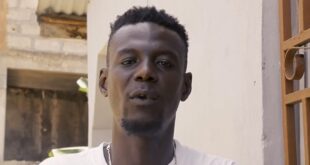Since the summer of 2018, hundreds of young migrants from Sub-Saharan Africa have arrived in Bayonne in France, located just 30 kilometers from the Spanish border. Some of them have been taken in by local families. Sixteen-year-old Ulrith from Cameroon is one of the migrant minors who received a warm welcome when he was taken in by Stéphanie and Pierre, who have four children. This is his story.
By Rémi Carlier
When Ulrith first set foot in Bayonne on October 24, he thought it was temporary and that he would quickly resume his journey to Paris “to find a solution” to his difficult life. After spending two-and-a-half years on the road – through Nigeria, Niger, Algeria, Morocco and Spain – Ulrith remains determined to one day put the last few kilometres that separates him from the French capital behind him. He has always dreamed of the place where in his mind, “people walk with their heads held high.”
But on October 24, his plans took an unexpected turn. After spending the first night in the city sleeping outside on the streets near the “Place des Basques”, Ulrith and three other travel companions crossed paths with Stéphanie, a schoolteacher involved in a local network aimed at helping migrants.
Stéphanie offered them to come to her house so that they could wash themselves. She then offered them a bed for the night. More than a month later, Ulrith is still staying there. His friends, however, have either continued on their journeys or are staying elsewhere.
“It wasn’t an easy decision to take him in,” Stéphanie, who has four daughters, recalls. “But the situation these youths were in totally shocked us. We’ve read articles [about the migrant situation] of course, but you don’t know what it’s about until you look into their eyes.”
‘I’ve always dreamt of having a brother’
The young Cameroonian quickly settled in in the family’s warm and cozy apartment, which is located in the heart of the city’s historic center, “Petit Bayonne”. “In the beginning, I was quite reserved, I didn’t want to open up, but when I saw how Stéphanie and her family acted towards me, I realized I was with good people,” he says.
Ulrith, a tall and big-built teenager with soft brown eyes, has changed some of the ways and habits in the household, which were previously ruled by the four girls who grew up there. “We could never have imagined we would one day take in a migrant!” Stéphanie’s husband Pierre says with a laugh. “But the disruption of his arrival is nothing compared with what we can provide for him,” he says.
Ulrith has been able to enroll in a private high school and can – finally – let his guard down and relax. Stéphanie and Pierre have offered him to stay for as long as he likes.
“I don’t consider us as an adoptive family,” Stéphanie says, noting Ulrith already has a family. “We’re his home.” But everyone is aware of how volatile his situation remains. Ulrith still hasn’t been recognized by the authorities as a minor. Stéphanie helps him with the paperwork, but the situation is complicated: It is up to Ulrith to prove that he is under the age of 18 in order to fight the “Dublin” status he’s already been labelled with. Ulrith’s fingerprints were taken and registered in Spain, and according to the Dublin accord, the decision on his request for asylum, therefore, lies with Spain.
‘If it’s legal to host someone? We’ve never even asked ourselves the question’
Fifteen-year-old Haize is the youngest of Stéphanie and Pierre’s four daughters, and is the only one of the couple’s children to still live at home. She says she was thrilled when she learned that Ulrith might stay.
“When, during a family dinner, they asked me if I’d be willing to let him stay, I realized I would have to step out of my comfort zone. But if it’s to offer someone else a comfort zone, it’s not a big thing to give up, and so I said yes,” she says with a smile, before adding: “And I’ve always dreamt of having a brother!”
Haize and her three sisters then agreed on giving up one of their rooms to give him. “If it’s legal to host someone? We’ve never even asked ourselves the question,” Pierre adds. “In the Basque country, people have always housed people illegally [especially] considering the history on the other side of the border [the Franco era].”
Ulrith says he is well aware of the luck he’s had. In contrast to dozens of young Guineans, Malians and Cameronians that he knows, he doesn’t have to sleep in Bayonne’s often overcrowded Pausa migrant reception center which only offers the bare minimums when it comes to comfort.
The center is located some 15 kilometers from the city center and the majority of the migrants who end up there can only stay for a limited period of time. When Ulrith goes to see his friends there, he tries to motivate them. “I try to comfort them, I tell them to not give up. It’s moving for me to see them because I know I could easily have been in their place.”
Ulrith says he has lived through some harrowing experiences on his journey. While crossing the desert between Niger and Algeria, for example, he was witness to both women and children dying. But his worst experience, he says, was in Morocco, where he spent over a year. “I was psychologically beaten up in that country. We hid in the forest, between Nador and Tanger. We had to run away from the police who were often beating us.”
In France to study
Ulrith doesn’t regret having left Cameroon. He says he simply didn’t have a choice. But he regrets that many people in his homeland feel like they have to flee “without really being threatened”. “I left Dibombari [a village some 38 kilometers from Douala, in the west] because of the insecurity. When my father died, my uncle took care of us, but it didn’t take long before he threatened to kill us. When I was nine, he forced me to quit school and I had no freedom anymore. I wanted to come to France to become somebody. I wanted to do my studies here before returning to Cameroon to help my family.”
Ulrith, who is someone who keeps his feet firmly on the ground, doesn’t want to worry. “With everything I’ve been through on the road, I told myself a long time ago that whatever happens, I have to keep going. I’ve been through both good and bad things on my journey, and it has made me the person I am today.”
© InfoMigrants
 THE AFRICAN COURIER. Reporting Africa and its Diaspora! The African Courier is an international magazine published in Germany to report on Africa and the Diaspora African experience. The first issue of the bimonthly magazine appeared on the newsstands on 15 February 1998. The African Courier is a communication forum for European-African political, economic and cultural exchanges, and a voice for Africa in Europe.
THE AFRICAN COURIER. Reporting Africa and its Diaspora! The African Courier is an international magazine published in Germany to report on Africa and the Diaspora African experience. The first issue of the bimonthly magazine appeared on the newsstands on 15 February 1998. The African Courier is a communication forum for European-African political, economic and cultural exchanges, and a voice for Africa in Europe.


























